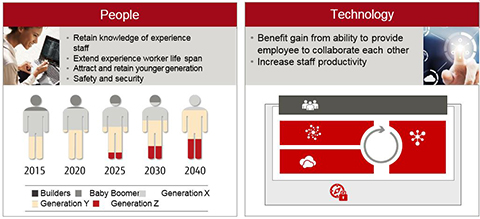Key drivers for workplace transformation in Thai organizations
A growing economy needs a new approach
 Workplace transformation key drivers
Workplace transformation key drivers
Thailand’s economy continues to develop as the government’s Thailand 4.0 initiative aims to make the country a high-income nation by 2021. To play their part in achieving this goal, Thai organizations need to compete as effectively as possible. This means attracting young, skilled workers and providing them with a workplace designed to harness their capabilities and creativity.
Generation Y and Generation Z are the workers born after 1981. They are digital natives and have grown up with technology as a key part of everything from education to entertainment. Automation and artificial intelligence (AI) are a given for many of these workers. Manual, repetitive processes are unattractive and most people will avoid working for companies where these tasks aren’t automated.
Furthermore, these younger workers demand a high level of flexibility from their employers. They want to work in an organization that can let them work just as effectively outside the office as inside.
And, an evolving attitude towards work means these employees don’t feel the same level of automatic loyalty as their predecessors; they’re likely to be very open to the idea of moving from company to company or even working as freelancers in the gig economy.
While the new generation of workers excels in their ability to harness technology for greater productivity and enjoyment, it’s important to remember that previous generations still have a great deal of valuable knowledge and experience that must, somehow, be conveyed to their younger colleagues and leveraged by the organizations they work for. Using technology to enable stronger collaboration and knowledge-sharing is crucial for organizations’ success as the proportion of younger workers increases and older workers exit the workforce.
Another key driver in the push towards more technology-enabled businesses is the demand from younger workers for human wellness and green office initiatives. Using IoT devices, companies can monitor and adjust air and lighting, for example, as well as energy usage and smarter use of resources. This maps to younger workers’ focus on environmental sustainability and personal wellness.
As these drivers are evolving, so are the technologies being used in businesses. Fujitsu’s research has shown that, in Thailand, tablets are overtaking PCs and laptops as the device of choice, lines are blurring between work and personal lives, and mobility is the rule rather than the exception. The use of social media continues to grow and more businesses are supporting bring your own device (BYOD) policies, which is giving workers the flexibility they crave. Consequently, Thai businesses that embrace these changes are seeing decreased costs alongside increased agility, collaboration, and productivity.
Ironically, as the use of technology expands and increases, it’s the human experience that is becoming more important to Thai workers. Technology exists to empower human workers and unleash their creative intelligence. The right technology enabled by a connected infrastructure can connect people and information in new ways to deliver unprecedented capabilities.
A Fujitsu Thailand customer needed to improve collaboration and mobility capabilities to make its office more attractive to new-generation workers. The business also had an immediate challenge regarding meeting room use. It could take more than 15 minutes for an employee to find a meeting room and, often, meeting rooms were booked but not used. This created inefficiencies that needed to be addressed.
Fujitsu Thailand proposed a collaboration solution which allowed the business’s employees to communicate using web, video, or voice conference on smart devices both inside and outside the office. The solution provided seamless capabilities regardless of the user’s location.
In the business’s meeting rooms, Fujitsu Thailand provided conference equipment, a smart digital whiteboard that lets meeting participants share ideas on the same whiteboard even when not in the meeting room, as well as the ability to present using Wi-Fi.
To streamline the management of meeting rooms, Fujitsu Thailand delivered a meeting reservation system that lets employees search for a room based on the number of seats and equipment required, and the date and time of the meeting. They can book the meeting room using a mobile application from anywhere in the world, and they can also check the meeting room status or book it from the signage that sits in front of the room itself.
This simple solution saves an enormous amount of time and lets employees collaborate without friction, leading to better productivity.
Businesses that fail to recognize and respond to the need to transform may find it difficult to attract and retain the best talent. Employment is very low in Thailand and young, skilled workers tend to prefer working in start-up companies that already have a culture that matches the younger generation’s work style. To get the best talent on board, medium- and larger-sized companies need to take this onboard and evolve to remain relevant to younger workers.
Fujitsu Thailand isn’t just a traditional service integrator that provides a piece-by-piece solution. Instead, we act as a consultant to help customers understand what they really need for effective transformation. For example, Fujitsu Thailand runs a design thinking workshop to help customers understand how to get to where they need to be with digital transformation.
At Fujitsu, we are world-leading experts in digital business transformation. We have in-depth knowledge of workplace trends and experience as a solutions integrator. We believe that digital co-creation is the fastest and most effective route to innovation and growth. Contact us to find out how our digital workplace solutions can transform your business and empower your employees.
Generation Y and Generation Z are the workers born after 1981. They are digital natives and have grown up with technology as a key part of everything from education to entertainment. Automation and artificial intelligence (AI) are a given for many of these workers. Manual, repetitive processes are unattractive and most people will avoid working for companies where these tasks aren’t automated.
Furthermore, these younger workers demand a high level of flexibility from their employers. They want to work in an organization that can let them work just as effectively outside the office as inside.
And, an evolving attitude towards work means these employees don’t feel the same level of automatic loyalty as their predecessors; they’re likely to be very open to the idea of moving from company to company or even working as freelancers in the gig economy.
While the new generation of workers excels in their ability to harness technology for greater productivity and enjoyment, it’s important to remember that previous generations still have a great deal of valuable knowledge and experience that must, somehow, be conveyed to their younger colleagues and leveraged by the organizations they work for. Using technology to enable stronger collaboration and knowledge-sharing is crucial for organizations’ success as the proportion of younger workers increases and older workers exit the workforce.
Another key driver in the push towards more technology-enabled businesses is the demand from younger workers for human wellness and green office initiatives. Using IoT devices, companies can monitor and adjust air and lighting, for example, as well as energy usage and smarter use of resources. This maps to younger workers’ focus on environmental sustainability and personal wellness.
Technology is enabling better human experiences
As these drivers are evolving, so are the technologies being used in businesses. Fujitsu’s research has shown that, in Thailand, tablets are overtaking PCs and laptops as the device of choice, lines are blurring between work and personal lives, and mobility is the rule rather than the exception. The use of social media continues to grow and more businesses are supporting bring your own device (BYOD) policies, which is giving workers the flexibility they crave. Consequently, Thai businesses that embrace these changes are seeing decreased costs alongside increased agility, collaboration, and productivity.
Ironically, as the use of technology expands and increases, it’s the human experience that is becoming more important to Thai workers. Technology exists to empower human workers and unleash their creative intelligence. The right technology enabled by a connected infrastructure can connect people and information in new ways to deliver unprecedented capabilities.
Case study: a better way to collaborate
A Fujitsu Thailand customer needed to improve collaboration and mobility capabilities to make its office more attractive to new-generation workers. The business also had an immediate challenge regarding meeting room use. It could take more than 15 minutes for an employee to find a meeting room and, often, meeting rooms were booked but not used. This created inefficiencies that needed to be addressed.
Fujitsu Thailand proposed a collaboration solution which allowed the business’s employees to communicate using web, video, or voice conference on smart devices both inside and outside the office. The solution provided seamless capabilities regardless of the user’s location.
In the business’s meeting rooms, Fujitsu Thailand provided conference equipment, a smart digital whiteboard that lets meeting participants share ideas on the same whiteboard even when not in the meeting room, as well as the ability to present using Wi-Fi.
To streamline the management of meeting rooms, Fujitsu Thailand delivered a meeting reservation system that lets employees search for a room based on the number of seats and equipment required, and the date and time of the meeting. They can book the meeting room using a mobile application from anywhere in the world, and they can also check the meeting room status or book it from the signage that sits in front of the room itself.
This simple solution saves an enormous amount of time and lets employees collaborate without friction, leading to better productivity.
The cost of not transforming
Businesses that fail to recognize and respond to the need to transform may find it difficult to attract and retain the best talent. Employment is very low in Thailand and young, skilled workers tend to prefer working in start-up companies that already have a culture that matches the younger generation’s work style. To get the best talent on board, medium- and larger-sized companies need to take this onboard and evolve to remain relevant to younger workers.
Co-creation for success with Fujitsu
Fujitsu Thailand isn’t just a traditional service integrator that provides a piece-by-piece solution. Instead, we act as a consultant to help customers understand what they really need for effective transformation. For example, Fujitsu Thailand runs a design thinking workshop to help customers understand how to get to where they need to be with digital transformation.
At Fujitsu, we are world-leading experts in digital business transformation. We have in-depth knowledge of workplace trends and experience as a solutions integrator. We believe that digital co-creation is the fastest and most effective route to innovation and growth. Contact us to find out how our digital workplace solutions can transform your business and empower your employees.
Explore our offerings
Sakon Khiewlamyong
Smart Workplace Specialist,
Fujitsu (Thailand) Co., Ltd.
Sakon is a Smart Workplace specialist and member of Fujitsu Thailand’s new pioneering team focused on digital innovation. He has more than 15 years’ background in network and security designing, consulting, supporting, and troubleshooting. Sakon is focused on supporting customers for digital transformation that helps them meet business goals.





